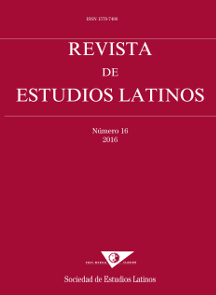Umbra feralis exercitus: ghost armies in the history of Rome
DOI:
https://doi.org/10.23808/rel.v16i0.82781Keywords:
ghost armies; prodigies; Latin literature; Roman history.Abstract
This paper analyses the development of the literary motif of ghost armies in Roman historical narratives. A study of the uses of the motif in different authors and texts aims to establish its characteristics, its roots in religion and popular culture, and its literary functions, as well as possible parallels between individual texts.
Downloads
References
Bernstein, A.E. (2009): “The ghostly troop and the battle over death: William of Auvergne”, en Poo, M. (ed.), Rethinking ghosts in world religions, Leiden-New York, Brill, 115-162.
Bernstein, N. (2012): “The dead and their ghosts in the Bellum Civille: Lucan’s visions of history”, en Asso, P. (ed.), Brill’s Companion to Lucan, Leiden-New York, Brill, 257-282.
Bloch, R. (1963): Les prodiges dans l’Antiquité, Paris, Presses Universitaires de France.
Boyancé, P. (1963): La réligion de Virgile, Paris, Presses Universitaires de France.
Brenk, F. (1986): “In the light of the moon. Demonology in Early Imperial period”, ANRW 2.16.3, 2107-2116.
Brenk, F. (1988): “Cassius ‘Epicurean’ explanation of Brutus vision in Plutarch Broutos”, en Gallo, I. (ed.), Aspetti dello stoicismo e dell’epicureismo in Plutarco, Ferrara, Giornale filologico ferrarese, 109-118.
Catrein, C. (2002): Vertauchte Sinne. Untersuchungen zur Synästhesie in der römischen Dichtung, Leipzig, De Gruyter.
Chassignet, M. (1996): L’Annalistique romaine: Tome I. Les Annales des pontifes et l’annalistique ancienne, Paris, Les Belles Lettres.
Crivăţ, A. (2011): “El léxico de lo extraordinario en las Etimologías de Isidoro de Sevilla (portenta, ostenta, prodigia, monstra)”, Revue roumaine de linguistique 56, 4, <http://www.lingv.ro/RRL-2011.html> [29/08/2016].
Davies, J. P. (2004): Rome’s Religious History: Livy, Tacitus and Ammianus on their Gods, Cambridge, Cambridge University Press.
Delgado, J.A. (2002): “Miedo al rayo, expiación y el problema de los “sacerdotes bidentales” en la religión romana”, en Díez de Velasco, F. P. (coord.), Miedo y religión, La Laguna, Ediciones del Orto, 245-256.
Dillery, J., (2002): “Quintus Fabius Pictor and Greco-Roman historiography at Rome”, en Miller, J.F., Damon, C., Myers, K.S. (eds.), Vertis in usum: Studies in Honor of Edward Courtney, Múnich, De Gruyter, 1-23.
Feeney, D. (1998): Literature and Religion at Rome: Cultures, Contexts, and Beliefs, Cambridge, Cambridge University Press.
Feeney, D. (2011): “The history of Roman religion in Roman Historiography and Epic”, en Rupke, J. (ed.), Companion to Roman Religion, Oxford, Oxford University Press, 129-143.
Fevrier, C. (2006): “Du prodige en poésie. Variations sur un thème épique”, en Chassignet, M., Champeaux, J. (eds.), Aere perennius: en Hommage à Hubert Zehnacker, París, Presses de l’université Paris-Sorbonne, 417-432.
Frier, B. W. (1979): Libri Annales Pontificum Maximorum: The Origins of the Annalistic Tradition, Roma, American Academy in Rome, 1979.
Gladhill, B. (2012): “Gods, Caesars and Fate in Aeneid 1 and Metamorphoses 15”, Dyctinna 9, <http://dictynna.revues.org/820> [21/08/2016].
Guzmán Almagro, A. (2013): “Fórmulas exorcísticas en la narrativa sobrenatural grecorromana”, MHNH 13, 15-32.
Guzmán Almagro, A. (2014): “¿Taciti manes? Fantasmas vivos y fantasmas parlantes”, Viator, 357-372.
Händel, P. (1959): “Prodigium”, RE 23.2, 2283-2286.
Jiménez Delgado, J. (1961): “La importancia del prodigio en Tito Livio”, Helmantica 12, 27-46.
Krauss, F.B. (1930): An interpretation of the omens, portents and prodigies recorded by Livy, Tacitus and Suetonius, Filadelfia, University of Pennsylvania.
Lecouteux, C. (1999): Les Chasses fantastiques et les cohortes de la nuit, Paris, Imago.
Lendon, J. E. (2006): Soldiers and ghosts: a history of Battle in Classical Antiquity, New Haven, Yale University Press.
Levene, D. S. Nelis, D. P. (2002): Clio and the Poets: Augustan Poetry and the Traditions of Ancient Historiography, Leiden, Brill.
Littlewood, J.L. (2011): A Commentary on Silius Italicus’ Punica 7, Oxford, Oxford University Press.
McBain, B. (1982): Prodigies and Expiation: A Study in Religion and Politics in the Roman Republic, (Collections Latomus 167), Bruselas, Latomus.
Mastandrea, P. (2005): Giulio Ossequente. Prodigi. Introduzione e testo di Paolo Mastandrea. Traduzione e note di Massimo Gusso, Milán, Oscar Mondadori.
Mastrosa, I.G. (2012): “Calamità e prodigi nella storia di Roma repubblicana: la rilettura tardoantica di Orosio”, Rursus 8 < https://rursus.revues.org/1084> [21/08/2016].
Narducci, E. (2002): Lucano. Un’epica contro l’Impero, Bari, Laterza.
Rasmussen, S. W. (2003): Public portents in Republican Rome, Roma, Analecta Romana Instituti Danici ( Suppl. 34).
Rawson, E. (1971): “Prodigy Lists and the Use of the Annales Maximi”, The Classical Quarterly 2, 21.1, 158-169.
Requena, M. (2006): “Nerón y los manes de Agripina”, Historiae 3, 83-108.
Rocca, S. (1978): Iulii Obsequentis Lexicon, Génova, Pubblicazioni dell’Istituto di Filologia Classica e Medievale.
Santini, C. (1988): “Letteratura prodigiale e sermo prodigialis in Giulio Ossequente”, Philologus 132, 210-226
Schmitt, J. C. (1994): Les revenants. Les vivants et les morts dans la société médiévale, París, Gallimard.
Schneider, C. (2011): Paranormale Antiquité. La mort et ses démons en Grèce et à Rome, París, Les Belles Lettres.
Stramaglia, A. (1998): Res inauditae, incredulae, storie di fantasmi nel mondo greco-latino, Bari, Levante Editori.
Vigourt, A. (2001): Les Présages impériaux d’Auguste à Domitien, París, Éditions de Boccard.
Weniger, L. (1906): “Feralis exercitus”, Archiv für Religionswissenschaft 9, 201-241.
Winkler, J. (1980): “Lollianos and the ‘Desperadoes’”, The Journal of Hellenic Studies 100, 155-181.
Wiseman, T.P. (2002): “History, poetry and annals”, en Levene, D.S., Nelis, D. P. (edd.), Clio and the Poets: Augustan Poetry and the Traditions of Ancient Historiography, Leiden-New York, Brill, 331-362.
Wittmann, R. (1968): “Flying saucers or flying shields”, Classical Journal 63, 223-226.
Wulker, L. (1903): Die geschichtliche Entwicklung des Prodigienwesens bei den Römern, Leipzig (Tesis doctoral disponible on-line, enlace: <https://archive.org/stream/diegeschichtlich00wlke/diegeschichtlich00wlke_djvu.txt>) [20/09/2016].
Downloads
Published
How to Cite
Issue
Section
License
Copyright (c) 2016 Revista de Estudios Latinos

This work is licensed under a Creative Commons Attribution-NonCommercial-NoDerivatives 4.0 International License.
The originals published in the printed and electronic editions of this journal are the property of the Revista de Estudios Latinos and can be circulated as long as the original source and authorship is made clear in any reproduction, full or partial, of the same, and as long as this is not done for commercial purposes.






